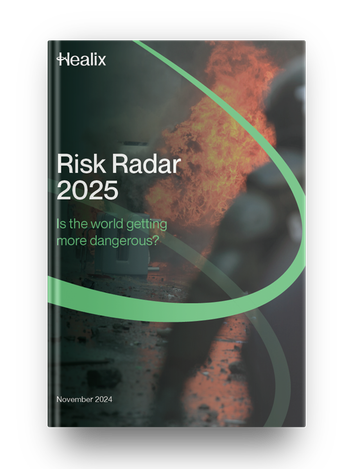Top risk: Political instability

Looking to 2025, political instability overtakes extreme weather as the top concern for businesses.
While climate risks remain important, this year’s survey highlighted that global disruptions and destabilising political changes have forced organisations to pivot their focus.
This is no surprise. The ripple effects of conflicts have been felt globally. Israel’s military response to Hamas in October 2023 has spread to Lebanon against Hezbollah, risking a broader regional conflict involving Iran and its proxies in Syria, Iraq and Yemen.
Instability across the Sahel is deepening, with Islamist insurgencies and military juntas backed by Russian mercenaries and other State- and non-State actors competing for control of strategic mineral resources.
The Sudanese civil war is a fast-growing humanitarian catastrophe, while tensions in the Horn of Africa rise between Ethiopia (itself struggling with internal insurgencies) and other neighbouring States over access to the Red Sea and natural resources including water.
Uncontrolled migration from conflict zones has strained political stability across Europe, with populist rhetoric stoking xenophobia. Meanwhile, China’s increasing military presence in the South China Sea and pressure on Taiwan could trigger a crisis in global supply chains, especially if US intervention becomes a possibility.
As global political instability rises, businesses must adapt to a future of volatility, shifting alliances, and escalating cyber threats.
Tensions within even established political structures have begun to emerge. The composition of the EU Parliament shifted after elections where the far-right surged and the continued stability of traditional alliances such as NATO have been called into question. Populism has, once again, risen as a challenger to mainstream political parties across the European Union. The two 'engines' of the EU, France and Germany, saw severe electoral setbacks for their incumbent administrations. Marine Le Pen's far-right National Rally is now the largest Parliamentary party. The 'traffic-light' coalition in Germany has collapsed, threatening snap elections.
2024 marked the most significant election year in history, with over half the world’s population heading to the polls. Significant electoral swings against incumbent governments was a dominant theme, with the ruling parties in, amongst others, India, South Africa, Japan, Taiwan, the UK, and not least the United States either losing their overall majorities or being defeated. The likely impact of the sweeping victory of the MAGA Republicans in the US on the global economy and the post-WWI rules-based order cannot be overstated.
At the same time, cyber threats from state-backed and criminal actors target critical infrastructure, from pipelines and financial networks to transport and energy grids. These asymmetric threats are ramping up in both scale and sophistication. Alongside this, hostile information campaigns, or “cognitive warfare,” add another layer of complexity by influencing public opinion and political stability.
Trust amongst the global community is eroding and as ever with geopolitical issues, no quick fix is apparent. As the global order continues to fragment, businesses face a future where volatility and unpredictability are the new normal, forcing them to rethink their risk management strategies.
